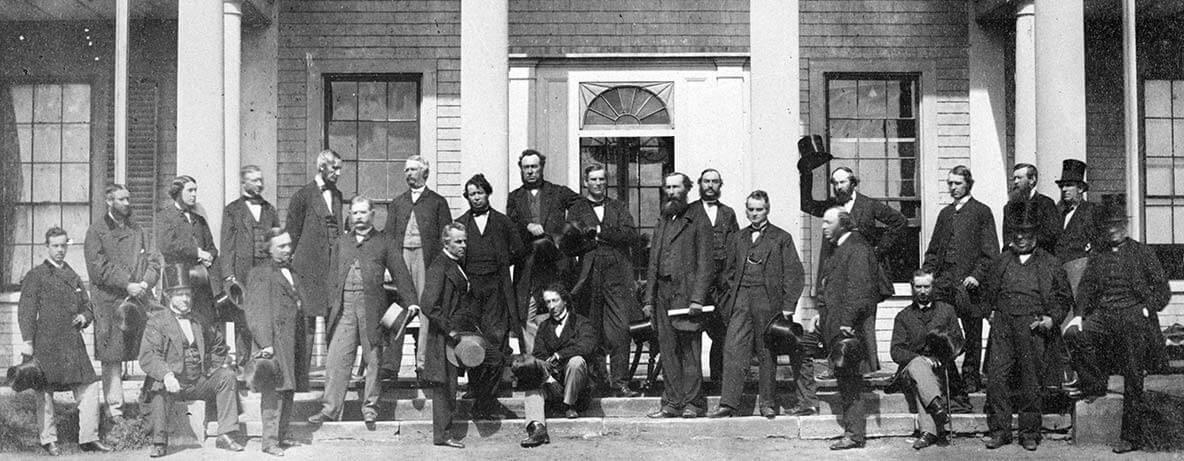[The following confidential letter was sent by the Canadian delegates alongside the preceding document. Also penned by Galt, it sets out a detailed proposal for the composition of the federal government and the division of powers between the federation and the provinces. The letter also contains language that has become the basis of a modern scholarly controversy. In a leading constitutional textbook, political scientist Peter Russell claims that Canadians have not yet become a sovereign people, citing Galt’s declaration below that the “basis of Confederation…does not profess to be derived from the people but would be the constitution provided by the imperial parliament.” Professor Janet Ajzenstaat vociferously disagrees, claiming the Canadian constitution is alive with popular sovereignty and the spirit of John Locke, pointing to the ratification process in each province and the appeals to popular sovereignty made in the course of the Confederation debates. Readers can decide for themselves, but it does appear from the following that Galt’s intended meaning was that the formal passage of the constitution by an act of the British parliament would permit easy amendment: “the means of remedying any defect, which is now practically impossible under the American constitution.” Also noteworthy is the off-hand reference to an elected Senate of Canada, and that the question is left open whether reserve powers not specifically delegated to the provinces should flow upward to the Parliament of Canada.]
Dear Sir Edward:
In the official communication which we have this day the honour to address to you, on the Confederation of the British North American provinces, we have felt it improper to offer any opinion upon the details which will form the subject of the proposed discussions by Delegates. It is also our duty not to cause embarrassment by advancing views which may yet have to be greatly modified. We venture, however, in compliance with your desire for a confidential communication on these points to suggest: –
That the Federal Government should be composed of a Governor-General, or Viceroy, to be appointed by the Queen, of an Upper House or Senate elected upon a territorial basis of representation, and of a House of Assembly, elected on the basis of population, the Executive to be composed of ministers responsible to the legislature.
That the powers of the Federal legislators and Government should comprehend the Customs, Excise and all trade questions, Postal Service, Militia, Banking, Currency, Weights and Measures and Bankruptcy, Public Works of a National Character, Harbours an Light-houses, Fisheries and their protection, Criminal justice, Public Lands, Public Debt and Government of unincorporated and Indian Territories. It will form a subject for mature deliberation whether the powers of the Federal Government should be confined to the points named, or should be extended to all matters not specially entrusted to the local legislatures.
The Confederation might involve the constitution of a Federal Court of Appeal.
The general revenue, having first been charged with the expense of collection and civil government, to be subject to the payment of interest on the public debts of the Confederation to be constituted from the existing obligations of each, – the surplus to be divided each year according to population. The net revenue from the Public Lands in each province to be its exclusive property, except in the case of the territories.
It may be expedient for a limited time to provide from the general revenue a certain fixed contribution for educational and judicial purposes until provision is made for the same by each member of the Confederation.
It will be observed that the basis of Confederation now proposed differs from that of the United States in several important particulars. It does not profess to be derived from the people but would be the constitution provided by the imperial parliament, thus affording the means of remedying any defect, which is now practically impossible under the American constitution. The local legislature would not be in a position to claim the exercise of the same sovereign powers which have frequently been the cause of difference between the American states and their general government. To this may be added that by the proposed distribution of the revenue each province would have a direct pecuniary interest in the preservation of the authority of the Federal Government. In these respects it is conceived that the proposed Confederation would possess greater inherent strength than that of the United States, and would combine the advantage of the unity for general purposes of a legislative union with so much of the Federation principle as would join all the benefits of local government and legislation upon questions of provincial interest.
We have, etc. etc.
(Signed)
G.E. Cartier
J. Ross
A.T. Galt


